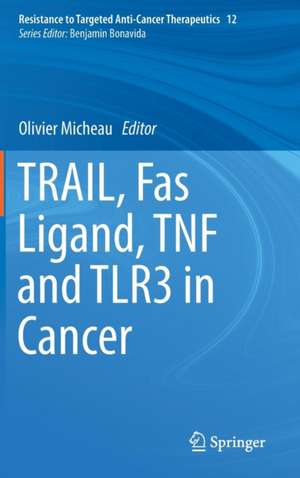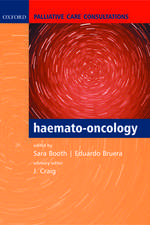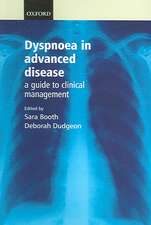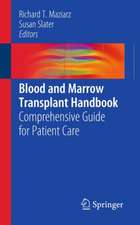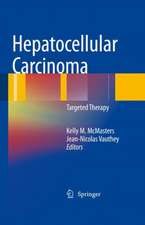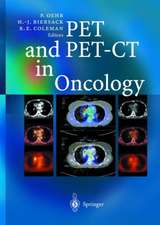TRAIL, Fas Ligand, TNF and TLR3 in Cancer: Resistance to Targeted Anti-Cancer Therapeutics, cartea 12
Editat de Olivier Micheauen Limba Engleză Hardback – 10 iul 2017
| Toate formatele și edițiile | Preț | Express |
|---|---|---|
| Paperback (1) | 1096.25 lei 6-8 săpt. | |
| Springer International Publishing – 12 aug 2018 | 1096.25 lei 6-8 săpt. | |
| Hardback (1) | 1103.22 lei 6-8 săpt. | |
| Springer International Publishing – 10 iul 2017 | 1103.22 lei 6-8 săpt. |
Din seria Resistance to Targeted Anti-Cancer Therapeutics
- 5%
 Preț: 718.10 lei
Preț: 718.10 lei - 5%
 Preț: 1107.21 lei
Preț: 1107.21 lei - 5%
 Preț: 1096.10 lei
Preț: 1096.10 lei - 5%
 Preț: 1100.30 lei
Preț: 1100.30 lei - 5%
 Preț: 1093.35 lei
Preț: 1093.35 lei - 5%
 Preț: 1093.88 lei
Preț: 1093.88 lei - 5%
 Preț: 1099.35 lei
Preț: 1099.35 lei - 5%
 Preț: 1096.10 lei
Preț: 1096.10 lei - 5%
 Preț: 841.00 lei
Preț: 841.00 lei - 5%
 Preț: 715.91 lei
Preț: 715.91 lei - 5%
 Preț: 714.83 lei
Preț: 714.83 lei - 5%
 Preț: 1093.88 lei
Preț: 1093.88 lei - 5%
 Preț: 712.25 lei
Preț: 712.25 lei - 5%
 Preț: 1024.59 lei
Preț: 1024.59 lei - 5%
 Preț: 723.57 lei
Preț: 723.57 lei - 5%
 Preț: 721.19 lei
Preț: 721.19 lei - 5%
 Preț: 721.19 lei
Preț: 721.19 lei - 5%
 Preț: 726.68 lei
Preț: 726.68 lei - 5%
 Preț: 723.21 lei
Preț: 723.21 lei - 5%
 Preț: 717.73 lei
Preț: 717.73 lei
Preț: 1103.22 lei
Preț vechi: 1161.29 lei
-5% Nou
Puncte Express: 1655
Preț estimativ în valută:
211.09€ • 220.42$ • 174.32£
211.09€ • 220.42$ • 174.32£
Carte tipărită la comandă
Livrare economică 15-29 aprilie
Preluare comenzi: 021 569.72.76
Specificații
ISBN-13: 9783319568041
ISBN-10: 3319568043
Pagini: 317
Ilustrații: XIII, 317 p. 40 illus., 35 illus. in color.
Dimensiuni: 155 x 235 mm
Greutate: 0.64 kg
Ediția:1st ed. 2017
Editura: Springer International Publishing
Colecția Springer
Seria Resistance to Targeted Anti-Cancer Therapeutics
Locul publicării:Cham, Switzerland
ISBN-10: 3319568043
Pagini: 317
Ilustrații: XIII, 317 p. 40 illus., 35 illus. in color.
Dimensiuni: 155 x 235 mm
Greutate: 0.64 kg
Ediția:1st ed. 2017
Editura: Springer International Publishing
Colecția Springer
Seria Resistance to Targeted Anti-Cancer Therapeutics
Locul publicării:Cham, Switzerland
Cuprins
Resistance to TRAIL Pathway-Targeted Therapeutics in Cancer.- TRAIL-R3/R4 and Inhibition of TRAIL Signalling in Cancer.- IAPs and Resistance to Death Receptors in Cancer.- Bcl-2 Proteins and TRAIL Resistance in Melanoma.- Regulation of Caspase-Mediated Apoptosis by the Tumor Suppressor Par-4.- Stem Cell Regulation by Death Ligands and Their Use in Cell Therapy.- Atypical Immune Functions of CD95/CD95L.- TLR3 is a Death Receptor Target in Cancer Therapy.- Fas/CD95, Lipid Rafts and Cancer.- Role of Sphingolipids in Death Receptor Signalling.- Post-Translational Modifications and Death Receptor Signalling.- System Modeling of Receptor-Induced Apoptosis.
Notă biografică
Dr. Olivier Micheau is a research director of the INSERM (French National Institute of Health), UMR1231. He received his PhD in Biochemistry and Molecular and Cellular Biology in 1999 from the University of Burgundy, France. He next moved as a post-doctoral fellow in Jurg Tschopp’s laboratory in Epalinges, Switzerland, from 1999 to 2003, where he elucidated the molecular mechanisms underlying TNFR1’s dual signaling ability. He described for the first time TNFR1 cytosolic pro-apoptotic complex II. In 2003 he joined the INSERM unit U517 headed by Professor E. Solary in Dijon, France, as an INSERM researcher. Member of several scientific councils, including INSERM CSS3 (2012-2016) and Fondation ARC pour la recherche sur le cancer, a French Charity (since 2015), he is also Associate Editor of the British Journal of Pharmacology since 2012. His scientific interest focuses on TRAIL receptor signaling and its use in cancer therapy.
Textul de pe ultima copertă
This volume provides the current understanding of death receptor's/TLR3 signaling regulation in cancer. Death receptors, including TRAIL-R1, TRAIL-R2, Fas and TNF-RI, owing to their ability to trigger apoptosis and to contribute to the elimination of cancer cells by the immune system have been considered, to variable extent, as important therapeutic targets for cancer therapy. But an increasing body of evidence suggests that some of these receptors may also contribute to tumorigenesis, or that new players such as TLR3 may be targeted for cancer therapy due to their ability to behave like death receptors.
Caracteristici
Provides an up-to-date overview of TNF family signal transduction with a special emphasis on TRAIL and Fas L Deals with cell biology, immunology and oncology and in particular drug-resistance mechanisms, as well as prometastatic potential, related to the cell biology of the downstream signaling components of the TNF superfamily Addresses how post-translational modifications of TNF related members or their cleavage by proteases affect their signaling capacity Includes supplementary material: sn.pub/extras
